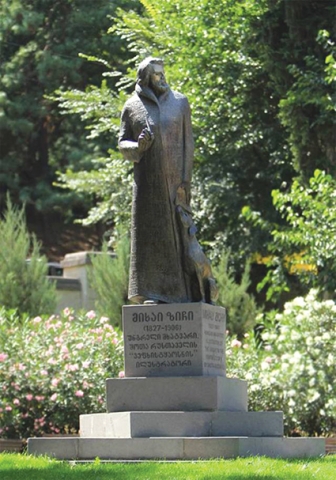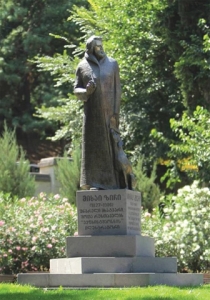National Library Hosts Memorial Evening for Zichy
The Memorial Evening for famous Hungarian artist Mihaly Zichy was held at the Georgian Parliament National Library and consisted of an exhibition of materials related to the artist kept at the National Library, as well as unique manuscripts kept at the National Manuscripts Center and illustrations for the ‘Knight in the Panther’s Skin.’
The only foreign artist to have illustrated the epic poem by Shota Rustaveli, Mihaly Zichy spent part of his life in Georgia and left a significant mark on the Georgian fine arts. Of the 34 pictures created by the painter, 27 were selected as illustrations to the poem.
Ambassador Extraordinary and Plenipotentiary of Hungary to Georgia, H.E: Sandor Szabo welcomed the guests, lording Zichy as a significant representative of the Hungarian romantic art of painting. Zichy was born at the beginning of the 19th century to a noble Hungarian family in Zala, western Hungary. After school his parents sent him to Budapest for legal studies, but being so talented in art, he gave preference to classes in painting in Vienna. Zichy travelled, lived and worked in Russia, Hungary and France through different periods of his life.
According to Ambassador Szabo, when the painter arrived in Tbilisi, preparations for a new edition of the ‘Knight in the Panther’s Skin’ were in full swing. Zichy was asked by the Georgian elite to illustrate Rustaveli’s epic poem, which he was ready to do with pleasure. He donated the full set of 34 pictures to the people of Georgia for free. Readers of the ‘Knight in the Panther’s Skin’ even today look with interest at the name ‘Zichy’, written by the artist in Georgian letters in the corners of his illustrations.
Among the illustrations on display was Zichy’s handwritten appreciation, in which he expresses his sympathy and cordial devotion to the nation of Georgia.
Ambassador Szabo reminded those present that ‘Knight in the Panther’s Skin’ has been translated into 52 languages. “It was translated into some languages more than once. This was the case with the Hungarian translations as well: the first was made by Béla Vikáron on Zichy’s recommendation and published in 1917, the second by Sándor Weöres, famous Hungarian poet and author, published in 1954. One of the best Russian language editions also contained illustrations by Zichy. Today, monuments of Mihály Zichy in Tbilisi and Shota Rustaveli in Budapest are the symbol of the recognition of the cultural heritage they left to us. They also symbolize the friendship of our two nations,” the Ambassador noted, ending his speech by thanking all the parties involved in preparing the event.
Chairman of Georgian Parliament, Mr. David Usupashvili, was also in attendance at the event. “Each of us here, when learning to read and write, and for the first time opening the ‘Knight in the Panther’s Skin,’ would first look through the illustrations, committing the heroes to memory. Zichy is the person who laid the path for us to Rustaveli, to the ‘Knight in the Panther’s Skin.’ Generations were raised and will be raised on this poem illustrated by Zichy.
So, his merit in our culture, our society is unique and particular.
Rustaveli and Zichy- two great persons, representatives of our nations and our countries, unite us and reveal our friendship from the best angle. I would like to have more such important evenings as we Georgians and Georgia have much in common with Europe.”
Levan Taktakishvili, Director of the Librarian Resources Department of the Georgian Parliamentary National Library, host of the event, said: “Our library keeps a full collection of reproductions by Mihaly Zichy. Within the project ‘Pirosmani,’ we intend to digitalize all our collections, including Zichy, and to make a virtual museum.”
Maka Lomadze











